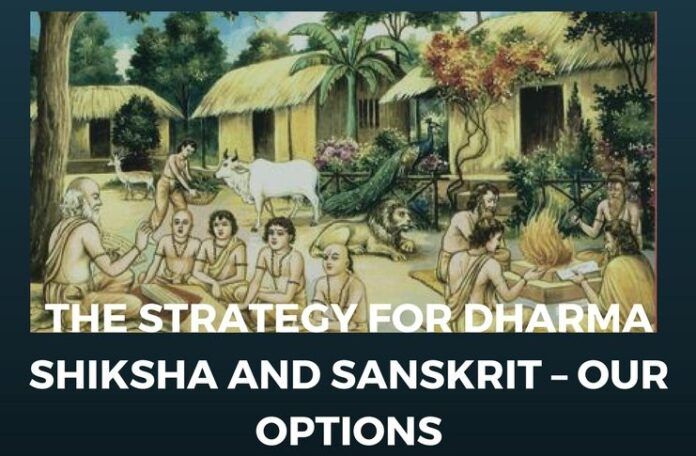
7th August is also celebrated as Sanskrit Diwas, do we know that?
On 7th of August, Raksha Bandhan will be celebrated all over the country. But do we Hindus know that it is also celebrated as Sanskrit Diwas? Leave alone, do people know the importance of Sanskrit in their socioeconomic and cultural life? What is the government doing for Sanskrit? Is it doing enough? Has it taken any step for the implementation of Dharma Shiksha? If not, then why, due to political considerations? What can the government do? What can the politicians do? Most importantly, what can the common people do for the Sanskrit and Dharma Shiksha? What are our options?
The issue of Dharma Shiksha has been subjected to debate every now and then. Debates revolve around a variety of issues, whether Dharma Shiksha be implemented or not, what should be the guiding principle for such an introduction and even its name! Because some may think that the name Dharma Shiksha would result in communalization of education. However, as I have discussed in my previous article, the concept of Dharma is very elaborate and universal, and hence should not create controversy.
If Sanskrit becomes the language of Dharma Shiksha, then slowly it will evolve into the national language of India; Sanskrit would be the language in which nationalism would be taught
What should be the medium of such a subject? Surely a subject like Dharma Shiksha, which stands for many issues including nationalism, must not be subjected to regionalization. Because if such a thing happens, its advantage would be cancelled out and we would be left with nothing. There must be a common language for teaching Dharma Shiksha all over the country. If this happens, Dharma Shiksha will become not just a subject, but a binding force for the people of the nation. Separating them would become more difficult with the passage of time until it becomes impossible. Thus, the medium must be acceptable to all people in all parts of the country. Only one language has this capability, which is none other than Sanskrit.
Hindi cannot be the medium of Dharma Shiksha for many reasons like :
- Not related to Dharma: It is a very well known fact that Hindi has evolved only during the last 1000 years. While the Sanatan Dharma has existed since time immemorial. Also, since the ancient scriptures of India are written in Sanskrit, translation would result in distortion of meanings, which would be inevitable.
- Not universal: It is true that Hindi is spoken by a large number of people. However, according to Census 2001, barely half of the population of the country recorded Hindi as their mother language. The Indians living in the south would not like if Hindi becomes the medium of Dharma Shiksha and it would again lead to regionalization of Dharma Shiksha.
Whereas Sanskrit, unlike Hindi, is far more suitable for this job because
- The basis of Dharma: Sanskrit is the very language in which Parmaatma sang the song of Vedas. This ancient language has been the language of India, and when it was the language of common people India was the most prosperous country in the world.
- Acceptable to all: No region of the country can claim that Sanskrit is being imposed on them. Since Sanskrit is intimately connected to all the Indian languages, all the people would have to do the same labour to learn Sanskrit, and there would be no discrimination. The Tamil people of South would only be happy to see Sanskrit as the medium of Dharma Shiksha.
If Sanskrit becomes the language of Dharma Shiksha, then slowly it will evolve into the national language of India; Sanskrit would be the language in which nationalism would be taught. However, these are only suggestions. It is up to the government to look upon these issues. However, it is only upon two entities to influence the government: Politicians and People.
What can a politician do? I think that a politician can actually do a lot if he desires so. He is the one who mobilizes the masses. Thus, by simple and very useful etiquettes, he can contribute to a Sanskriticised Nation and Sanskriticised people.
In this way, by the decade of the 2050s, Sanskrit would be revived, it will become the language of all, and India will become prosperous again as it was in the past
Those politicians whose ideologies are based on Hindutva should wish their audience and the people present in their rallies in Sanskrit and in the end of their speech should also make their audience take the pledge in Sanskrit, that they would work together for the nation. In this way, Sanskrit’s revival would get a boost. Similarly, their posters should also address people in Sanskrit.
What can a common citizen do? I think that common people do not need any suggestions since they are already doing enough. One can visit a town like Varanasi, where people voluntarily take up the cause for Sanskrit and organize tasks for the benefit of all. The common people must not forget that 21st century is the era of renaissance and should try to make a significant contribution to this process.
In this way, by the decade of the 2050s, Sanskrit would be revived, it will become the language of all, and India will become prosperous again as it was in the past. In this context, I would like to quote our Geography teacher Dr Shyam Bihari Pandey,” India was so developed in the past, had Vedas would have been patented, India would have remained so.”
Note:
1. The views expressed here are those of the author and do not necessarily represent or reflect the views of PGurus.
- The Strategy for Dharma Shiksha and Sanskrit – Our Options - August 6, 2017
- Dharma Shikshaa – The need of the nation - June 26, 2017









Sir, till now not aware that Raksha Bandhan day is also ‘Sanskrit Day’. Thanks for enlightening. Far from competition among languages, the author has put his thoughts forcefully. So hopefully Sanskrit would some day occupy its rightful place in Bharat. One suggestion , however; some NGO can undertake evening classes in school rooms for propagating the language among senior citizens and other interested categories.